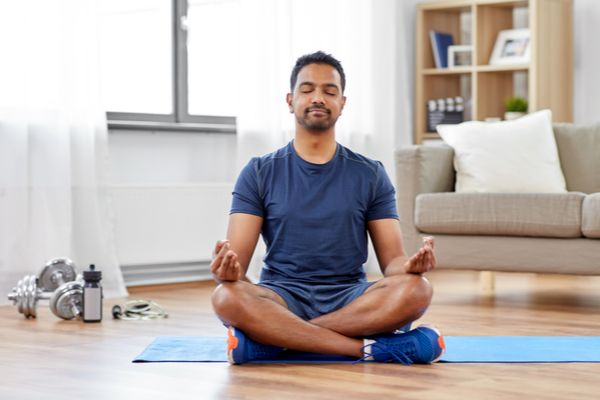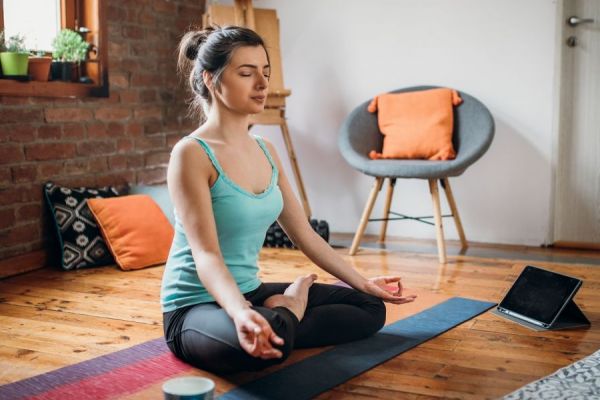5 tips for practicing self-love

You may have spent this past Valentines Day with someone you care about, but just because Valentine’s Day is over doesn’t mean that you can’t still focus on love, specifically self-love! Here are a few tips to help you practice self-love in your everyday life:
1. Engage in positive self-talk
Self-talk is your inner voice that you use to talk to yourself. The way you talk to yourself can affect how you feel and the way you view your situation, which is why it is important to practice positive self-talk. Using positive self-talk is one way you can practice self-love because it can help you feel more positive about yourself and your experiences.
You may not realize how often you speak to yourself negatively, so the first step to engage in positive self-talk is paying attention to your inner voice throughout the day and noting how you talk to yourself. Do you discourage yourself? Do you critique the things that you do throughout the day? Once you start recognizing negative thought patterns, you can start changing your patterns to be more positive. Practice changing negative thoughts to positive ones. For example, try telling yourself that you are capable, you are strong, you will improve, and you are doing your best. Be patient with yourself – changing thought patterns takes time and practice. Over time, it will become more habitual to engage in positive self-talk.
2. Find balance in your daily life
Your daily activities can be divided into 3 categories: self-care, productivity, and leisure. All these activities are important for your physical and mental health, but everyone prioritizes these activities differently. For example, some people feel their best when they focus most of their time on productive activities, while others may feel their best when they spend more time on their self-care or leisure activities.
No matter what your preference is, it is important to find some balance with these daily activities, meaning that you spend some time engaging in each of them daily. If you are having challenges balancing these activities, try planning your day in advance using a day-planner to schedule some time to prioritize activities that your day may be lacking, even if it is only for a few minutes. By finding balance with your daily activities, you are practicing self-love because you are ensuring that you are taking care of yourself, attending to your responsibilities, while also ensuring there is time for fun and relaxation.
3. Set boundaries
Setting boundaries with others can be difficult, but it is a great way to practice self-love because it can help you prioritize your needs. When someone is crossing a boundary or asking something of you that you are not comfortable with, you can set boundaries using assertive language in a respectful manner. First, check-in with yourself to understand how you’re feeling. If you think you need to set a boundary, start by focusing on the facts: label your emotions and understand the situation you are in with this person.
Next, consider what your needs are in this situation so you can communicate them. Then, in an assertive and respectful manner, tell the person how you understand the situation, how you feel about it, and share what your needs are. For example, you might tell someone that you understand that they want to spend time with you and express that you appreciate this, but you feel tired and need to rest, so you can ask that you spend time together another day instead. It is important that you prioritize your needs, but often people don’t know or understand how we perceive a situation, how we feel about it, and what our needs are, so it is important to clearly communicate these things to others to do our best to get on the same page.
4. Reward your accomplishments
You can practice self-love by rewarding your accomplishments, no matter how big or small they are. It is important to celebrate and reward your daily accomplishments to encourage yourself and make yourself feel good. The more you celebrate your accomplishments, the better you will feel and the more likely you are to want to keep progressing with your goals and daily activities.
Everyone’s accomplishments will look different depending on where they are in recovery. For some people, getting out of bed or showering can be a huge accomplishment whereas for others, it could be getting through a workday or doing housework. Next time you accomplish something, try rewarding yourself in a healthy manner. This may include engaging in positive self-talk, doing a pleasurable activity, or taking a break. Whatever you choose to do to reward yourself, ensure it is enjoyable and makes you feel good.
5. Nourish your body, mind, and soul

When practicing self-love, it is important to consider your whole self, meaning your mind, your body, and your soul. People tend to feel their best when they have healthy habits to promote health and wellbeing for their whole self. You can nourish your body with a balanced and healthy diet and by engaging in regular physical exercise. There are many ways you can nourish your mind. For example, you can practice positive self-talk or find ways to challenge your brain, such as doing puzzles or completing a complex task. Lastly, there are also many ways you can nourish your soul.
Nourishing your soul can mean different things to different people, but the main idea is that that you do things that are meaningful to you. This could be religious activities, spending time with loved ones, volunteering, or engaging in your favourite hobby. By finding ways to nourish your mind, body, and soul, you ensure that you are practicing self-love for your whole self.
There are many ways to practice self-love, but these are a few ideas to help you start or continue your self-love journey. It can be practiced at any time; you are encouraged to practice self-love daily. Your mind, body, and soul will thank you!
If you feel like you need support, please reach out. Check our locations page to find a clinic near you or book online to schedule an appointment.
This blog was written by Jenna Gaskin, an Occupational Therapy student from McMaster University.
Related Articles
Understanding minority stress: How to be an 2SLGBTQI+ ally
How occupational therapy can help address mental health concerns
Don't put off the care you need - here's why
Supporting our veterans with focused, holistic care
#GetReal for Mental Health Week: How I am holding up during the COVID crisis
Psychotherapy at a distance: Using Virtual Care to support mental health
How to set up your work environment when working from home
How my daughter’s Occupational Therapist made a difference
How occupational therapy can help with concussion management
Keep yourself safe at work and out of physio
Let's keep in touch!
SIGN UP TO GET HEALTH AND WELLNESS INFO RIGHT TO YOUR INBOX
Subscribe to receive the latest health and wellness news and information in your inbox every month.
By subscribing you agree to our privacy policy. You can unsubscribe at any time.

















































































We can help you move and feel better.
Book an appointment today.